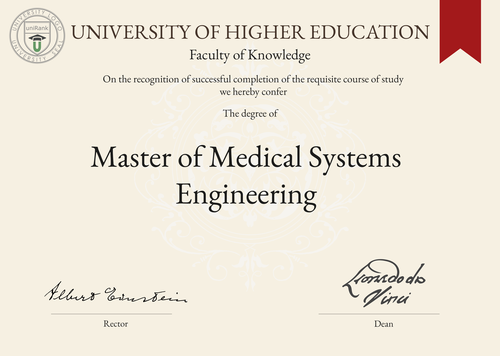
Master of Medical Systems Engineering (M.MSE)
Guide to Master of Medical Systems Engineering Program/Course/Degree
Master of Medical Systems Engineering (M.MSE)

Program Name:
Master of Medical Systems EngineeringProgram or Degree abbreviation:
M.MSEDuration range:
The duration of the program typically ranges from 1 to 2 years.Tuition range:
The tuition fees for the program can vary depending on the chosen country or university. It is recommended to check with specific institutions for accurate information.Overview:
The Master of Medical Systems Engineering program is designed to provide students with a comprehensive understanding of the engineering principles and technologies used in the healthcare industry. It focuses on the development, implementation and management of medical systems and devices to improve patient care and outcomes.Curriculum Overview by year:
- Year 1: - Introduction to Medical Systems Engineering - Biomedical Instrumentation - Medical Imaging Systems - Healthcare Data Analytics - Medical Device Design and Development - Year 2: - Clinical Engineering - Healthcare Information Systems - Regulatory Affairs in Medical Systems - Quality Assurance in Healthcare - Research ProjectKey Components:
- Understanding of medical systems and technologies - Proficiency in biomedical instrumentation and medical imaging - Knowledge of healthcare data analytics and information systems - Expertise in medical device design and development - Understanding of clinical engineering and regulatory affairs in the healthcare industryCareer Prospects:
Graduates of the Master of Medical Systems Engineering program can pursue various career paths in the healthcare industry. They can work as biomedical engineers, clinical engineers, medical device designers, healthcare consultants, or research scientists in hospitals, medical device companies, research institutions and government agencies.Salary Expectations:
The salary expectations for professionals with a Master of Medical Systems Engineering degree can vary depending on factors such as experience, location and industry. On average, graduates can expect competitive salaries in the healthcare industry, with potential for growth and advancement. For a more accurate understanding of salary expectations, you can utilize the Job Sites Search Engine, from our sister site jobRank, which searches over 4,600 job sites worldwide. Make sure to specify not only the job title but also the country you are interested in.Conclusions:
It is important to note that the duration, tuition fees, curriculum, key components, career prospects and salary expectations of the Master of Medical Systems Engineering program can vary based on the chosen country or location of study, as well as the specific university offering the program. Prospective students are advised to research and compare different institutions to find the best fit for their academic and career goals. Visitors interested in pursuing a Master of Medical Systems Engineering degree can use the uniRank World Universities Search Engine to search for universities offering this specific degree anywhere in the world. This tool provides a comprehensive database of universities and their programs, allowing individuals to find the most suitable options for their educational journey.World Universities Search Engine
search for Master of Medical Systems Engineering (M.MSE) and add the Location (country, state etc.) or specific University you are interested in studying at.
Query examples:
- Master of Medical Systems Engineering (M.MSE) United States
- Master of Medical Systems Engineering (M.MSE) United Kingdom online
- Master of Medical Systems Engineering (M.MSE) Australia international students
- Master of Medical Systems Engineering (M.MSE) University of California
- Master of Medical Systems Engineering (M.MSE) University of London tuition fees
- Master of Medical Systems Engineering (M.MSE) University of Sydney scholarships
Share Program/Course
Interesting? Share this program/course/degree info with your friends now.